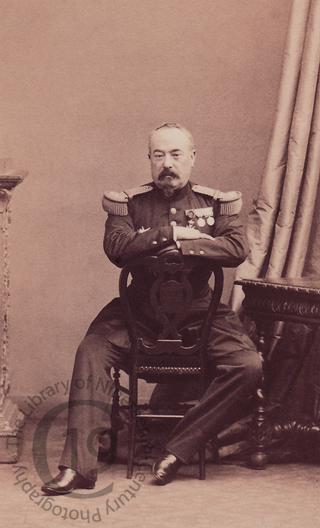
Maréchal Bazaine
A carte-de-visite portrait of Marshal Achille Bazaine (1811-1888).
Bazaine first came to notice as the commander of the French during the disastrous French expedition to Mexico (1862-1867). He was made commander-in-chief of the French army (1870) after the initial defeats in the Franco-Prussian War and made the tactical error of trying to defend Metz, where his army was surrounded. The attempt by Napoleon III and MacMahon to relieve him led to the decisive French defeat at Sedan. Soon afterwards Bazaine surrendered the Army of the Rhine. He and 140,000 French soldiers were taken prisoner.
The responsibility for this crushing blow naturally enough, and justly enough, fell on Bazaine's shoulders. When he returned from captivity he enjoyed a brief period of immunity but in 1873 he was brought to trial before a military court. He was found guilty of negotiating with and capitulating to the enemy before doing all that was prescribed by duty and honour. The sentence of the court was degradation and death, but with a strong recommendation for mercy. Bazaine’s sentence was commuted to twenty years' seclusion, and the humiliating ceremonies attending degradation were dispensed with. He was incarcerated on the Île Sainte Marguerite (about half a mile of the coast of Cannes) and treated more like an exile than a convict. Accompanied by his wife, he escaped by boat in 1874 to Genoa, with the help of Angelo Hayter, son of the painter Sir George Hayter. He then came to London with his young family, where he stayed with his Hayter relations. He finally took up residence in Madrid, where he was treated with marked respect by the government of Alfonso XII, who were grateful for Bazaine’s conspicuous bravery as a young Foreign Legion officer during the Carlist War.
Photographed by Disdéri of Paris.
Code: 124196




